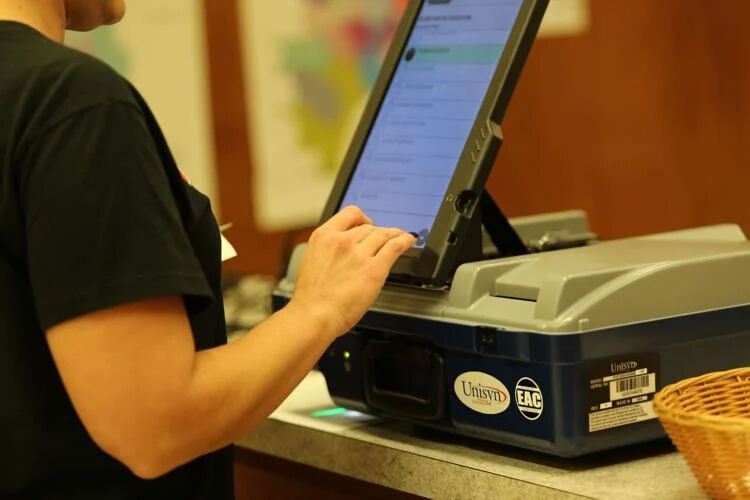Tennessee lawmaker favors mirroring Georgia’s statewide voting system
Published 12:00 am Friday, January 14, 2022

- A voting machine in Floyd County, Indiana.
NASHVILLE — A Tennessee state representative says he wants to instill more “confidence” in the state’s elections by implementing an electronic system similar to that used in Georgia since 2020.
Initially, Republican Rep. Bruce Griffey filed a bill Dec. 29 to only allow votes to be cast by paper ballots statewide. According to the bill, HB 1662, ballots could only be hand-marked and must be counted using an electronic optical ballot scanner.
However, Griffey said Monday he plans to re-draft the bill after speaking with Hardin County elections representatives about the county’s two-step voting verification process, which is similar to one used in Georgia.
Georgia’s voting machines were purchased from Dominion Voting which drew the ire of President Donald Trump loyalists who falsely claimed the Georgia presidential election was “rigged,” despite the fact November 2020 results were re-certified and have been verified by two statewide audits and two recounts.
John White, Hardin County, Tennessee, election commission chair, said its voting system — manufactured by Election Systems & Software — allows voters to make selections for each race via a touch screen computer. Once a voter confirms the selection, the ballot with the voter’s selections is printed on paper.
Though a bit more time consuming, White said voters can then look over their selections on paper before inserting the paper ballot into a separate machine that officially casts the ballot.
“In the event of a contest, you’ve got a paper trail. … Then you can double check to be sure that that’s what the machine says,” White said.
The system is used in at least 15 counties in Tennessee. Hardin County began using it in the last election cycle last year.
Griffey said he supports using the system statewide, especially as it still contains a paper ballot component that doesn’t solely rely on a machine.
“I don’t have a problem with that approach. As long as there’s some kind of paper ballot that the voter can verify themselves,” Griffey said. “You don’t need a computer to read QR codes or whatever like that … and they can be counted by hand or machine later on, really doesn’t matter. Everybody ought to be comfortable with that approach and so that’s what I’m going to drive for.”
In Griffey’s home county — Henry County — voters cast their ballots via a machine that prints a sheet of paper which serves as confirmation of the ballot; however, voters can’t see their selections on paper, which also presents challenges should a hand recount or audit be requested.
The system is used in Cumberland County and half of counties in the state; more than half of Mississippi counties also use a similar system, according to verified voting.org.
“There’s no way to know how many votes for this or that, you’re just dependent upon the machine and software which I think a lot of voters have had problems with,” Griffey said. “We’re all familiar with how much hacking and computer fraud there is in the world today. After the 2020 election, I think everyone wants to have greater confidence, so if we can improve the technology, before they start buying new machines, let’s look at the options.”
Georgia was the first state to implement such a system statewide in 2020.
Walter Jones, Georgia Secretary of State’s communications manager for voter education, said the fairly new system proved more efficient following the November 2020 presidential election, when a hand count and audit were critical in determining victors in tight, key races in the state.
“An audit is where you take a sample of ballots and physically count them to see if those results are reflective of the overall results,” he explained. “If it isn’t, that doesn’t mean there’s something wrong with it, it just means you need to do a bigger sample. That’s just another way to check to make sure things are working right.”
Jones said the electronic-paper ballot merger system makes it easier on election officials, who would have otherwise had to have printed variations of ballots within a precinct.
“It’s a pain to keep up with so many paper ballots and you never know how many to print,” Jones recalled of Georgia’s previous voting system. “You got to have them all there on Election Day and you have to make sure you don’t give somebody the wrong ballot because most of the time the voter isn’t going to know.”
Jones said election officials perform accuracy and logic tests on the machines before and after elections.
The majority of the country, including Alabama, still uses paper ballots as the only means of voting, though some of those states offer ballot-marking devices for accessibility.




